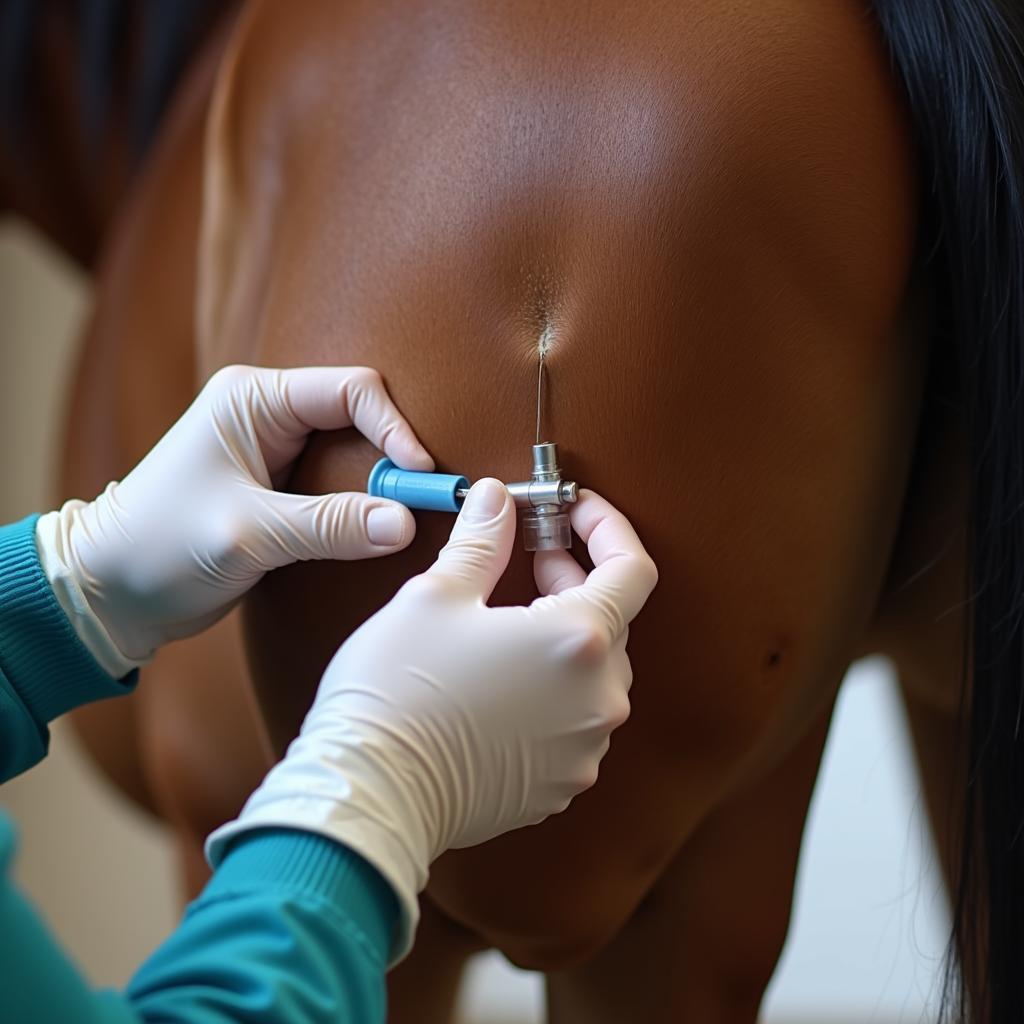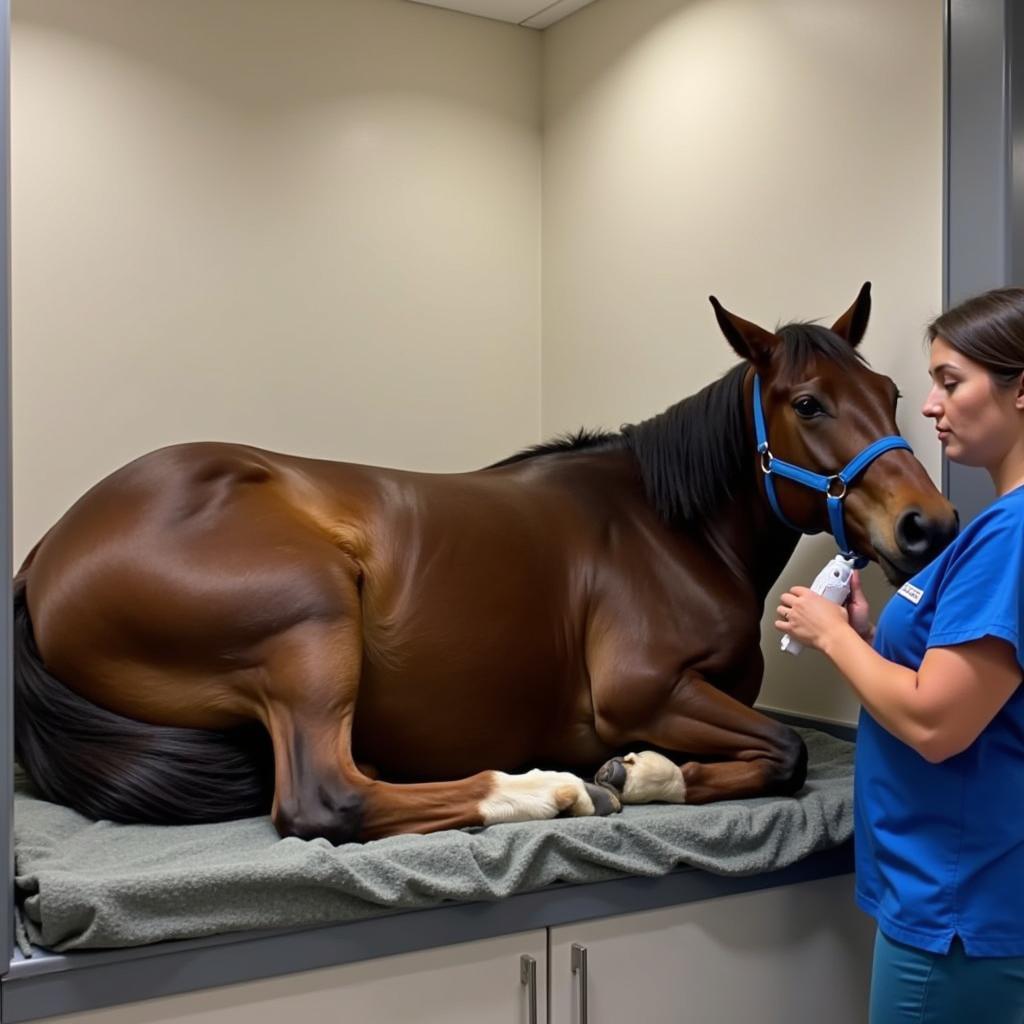Ketamine is a powerful anesthetic frequently used in veterinary medicine, particularly in equine practice. It’s known for its rapid onset of action and ability to provide pain relief, sedation, and muscle relaxation. While ketamine can be an invaluable tool for managing various horse health issues, it’s crucial to be aware of its potential side effects.
 Veterinarian Administering Ketamine to a Horse
Veterinarian Administering Ketamine to a Horse
Common Side Effects of Ketamine in Horses
Like any medication, ketamine can cause side effects in horses. Some side effects are mild and transient, while others can be more serious. It’s important to remember that every horse is an individual, and reactions to ketamine can vary.
Here are some of the common side effects observed in horses administered ketamine:
- Ataxia and incoordination: Ketamine can cause temporary incoordination and unsteadiness in horses, making them appear wobbly or clumsy.
- Increased movement and agitation: Paradoxically, some horses may exhibit increased movement, agitation, or excitement after receiving ketamine.
- Muscle tremors: Fine muscle tremors are a relatively common side effect, usually subsiding as the drug wears off.
- Nystagmus: This refers to rapid, involuntary eye movements.
- Changes in heart rate and blood pressure: Ketamine can influence both heart rate and blood pressure.
- Respiratory depression: In higher doses, ketamine can suppress respiratory function.
 Horse Recovering from Ketamine Anesthesia
Horse Recovering from Ketamine Anesthesia
Factors Influencing Ketamine Side Effects in Horses
Several factors can influence the likelihood and severity of ketamine side effects in horses:
- Dosage: Higher doses are more likely to cause pronounced side effects.
- Route of administration: Intravenous administration typically produces more rapid and intense effects compared to intramuscular injections.
- Individual sensitivity: Some horses are simply more sensitive to ketamine than others.
- Underlying health conditions: Horses with pre-existing health issues, especially heart or respiratory problems, may experience more significant side effects.
- Concurrent medications: The use of ketamine alongside other medications can increase the risk of adverse reactions.
Minimizing Ketamine Risks and Ensuring Safe Use in Horses
Veterinarians take several precautions to minimize the risks associated with ketamine use:
- Careful patient assessment: A thorough physical examination and review of medical history helps determine a horse’s suitability for ketamine.
- Appropriate dosage and administration: Administering the correct dosage via the appropriate route is crucial for minimizing side effects.
- Close monitoring: Vital signs, including heart rate, respiratory rate, and blood pressure, are closely monitored during and after ketamine administration.
- Supportive care: Providing a safe and comfortable environment for recovery is essential.
When to Contact Your Veterinarian
If you notice any unusual signs in your horse after ketamine administration, it’s crucial to contact your veterinarian immediately. Early intervention is key to managing potential complications and ensuring your horse’s well-being.
Remember: This information is intended for general knowledge and should not be considered a substitute for professional veterinary advice. Always consult with your veterinarian regarding any health concerns or before making decisions about your horse’s care.
FAQs about Ketamine for Horses
1. How long does it take for ketamine to wear off in horses?
The duration of ketamine’s effects varies depending on the dosage and route of administration. Typically, horses begin to recover from ketamine anesthesia within 30-60 minutes, but full recovery can take several hours.
2. Can ketamine be used in pregnant mares?
Ketamine should be used with caution in pregnant mares, especially during the last trimester, as it can cross the placental barrier and potentially affect the foal. Your veterinarian will carefully weigh the risks and benefits before administering ketamine to a pregnant mare.
3. Is ketamine painful for horses?
Ketamine itself is not generally considered painful when administered properly. However, some horses may experience temporary discomfort or a burning sensation at the injection site.
4. What should I do if my horse experiences side effects from ketamine?
Contact your veterinarian immediately if you observe any concerning signs in your horse after ketamine administration. Do not attempt to treat your horse without professional guidance.
5. Are there any alternatives to ketamine for horses?
Yes, depending on the specific situation, several alternative anesthetics and sedatives can be used in horses. Your veterinarian will recommend the most appropriate option based on your horse’s individual needs and the procedure being performed.
Need Help with Your Horse’s Health?
We are here to help! Contact us at Phone Number: 0772127271, Email: [email protected] or visit us at QGM2+WX2, Vị Trung, Vị Thuỷ, Hậu Giang, Việt Nam. Our team is available 24/7 to assist you with any questions or concerns about your equine companion.